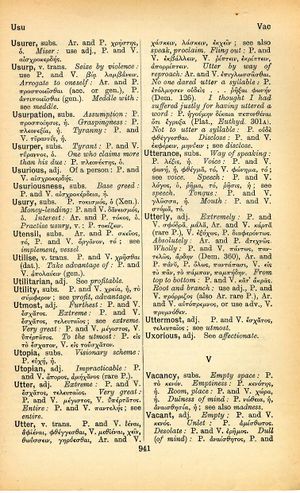vacant: Difference between revisions
From LSJ
ἡμῶν δ' ὅσα καὶ τὰ σώματ' ἐστὶ τὸν ἀριθμὸν καθ' ἑνός, τοσούτους ἔστι καὶ τρόπους ἰδεῖν → whatever number of persons there are, the same will be found the number of minds and of characters
(Woodhouse 5) |
(CSV5) |
||
| Line 1: | Line 1: | ||
{{ | {{Woodhouse1 | ||
| | |Text=[[File:woodhouse_941.jpg|thumb|link={{filepath:woodhouse_941.jpg}}]]'''adj.''' | ||
<b class="b2">Empty</b>: P. and V. [[κενός]]. | |||
<b class="b2">Unlet</b>: P. [[ἀμίσθωτος]]. | |||
<b class="b2">Desolate</b>: P. and V. [[ἐρῆμος]]. | |||
<b class="b2">Dull</b> (<b class="b2">of mind</b>): P. [[ἀναίσθητος]], P. and V. [[νωθής]]; see [[mad]], [[foolish]]. | |||
<b class="b2">Be vacant, be at leisure</b>, v.: P. and V. σχολὴν ἔχειν, σχολάζειν. | |||
}} | }} | ||

